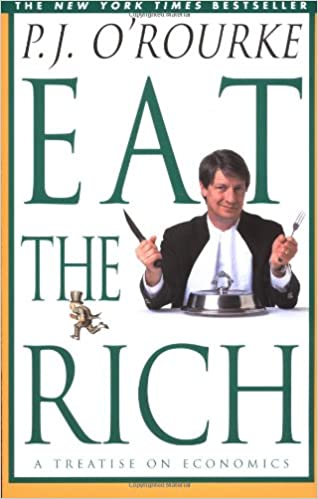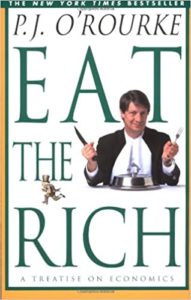

Humorist P.J. O’Rourke died this morning, at age 74, of lung cancer. As well as being a humorist generally, he was the top economic humorist in the United States.
I loved his book Eat the Rich: A Treatise on Economics. In a review of the book I wrote somewhere, I said, “So think of O’Rourke as a modern Adam Smith, with these two differences: O’Rourke’s data are more recent, and you’ll get side-splitting laughs on every page.”
My favorite passage is the opening paragraph:
I had one fundamental question about economics: Why do some places prosper and thrive while others just suck? It’s not a matter of brains. No part of the earth (with the possible exception of Brentwood) is dumber than Beverly Hills, and the residents are wading in gravy. In Russia, meanwhile, where chess is a spectator sport, they’re boiling stones for soup. Nor can education be the reason. Fourth graders in the American school system know what a condom is but they’re not sure about 9 x 7. Natural resources aren’t the answer. Africa has diamonds, gold, uranium, you name it. Scandinavia has little and is frozen besides. Maybe culture is the key, but wealthy regions such as the local mall are famous for lacking it.
My second favorite passage, about his trip to the newly emerging Shanghai:
And omnipresent amid all the frenzy of Shanghai is that famous portrait, that modern icon. The faintly smiling, bland, yet somehow threatening visage appears in brilliant red hues on placards and posters, and is painted huge on the sides of buildings. Some call him a genius. Others blame him for the deaths of millions. There are those who say his military reputation was inflated, yet he conquered the mainland in short order. Yes, it’s Colonel Sanders.
My third favorite passage is the part where he discusses economics textbooks and one textbook in particular:
Looking into an economics textbook as an adult is a shock (and a vivid reminder of why we were so glad to get out of school.) The prose style is at once peurile and impenetrable, Goodnight Moon rewritten by Henry James.
And his comments on Economics by Paul A. Samuelson:
And here was another shock. Professor Samuelson, who wrote the early editions by himself, turns out to be almost as much of a goof as my friends and I were in the 1960s. “Marx was the most influential and perceptive critic of the market economy ever,” he says on page seven. Influential, yes. Marx nearly caused World War III. But perceptive? Samuelson continues: “Marx was wrong about many things . . . but that does not diminish his stature as an important economist.” Well, what would? If Marx was wrong about many things and screwed the baby-sitter?
P.J. was not just an economic humorist, though. He was a pretty decent economics thinker. Years ago, I opened, with some skepticism, P.J.’s book On the Wealth of Nations, in which he went through Adam Smith‘s The Wealth of Nations pretty much chapter by chapter. He really got Smith, including a lot of nuances. Indeed, his book helped me realize why I could never get through the sections on taxation in The Wealth of Nations.
I will miss P.J.

READER COMMENTS
KevinDC
Feb 15 2022 at 10:08pm
I don’t know if PJ knew this, but according to a biography of Marx I read a few years ago, Marx actually did screw the babysitter. I, too, will miss PJ. His mind was as sharp as his wit.
Scott Sumner
Feb 16 2022 at 1:38am
Yes, he was an outstanding humorist. I loved Republican Party Reptile and Holidays in Hell. I seem to recall him saying that only communism could take a nation of 20 million Germans and make it poor.
MarkW
Feb 16 2022 at 6:33am
There’s a lot of P.J. O’Rourke that I haven’t gotten around to reading, but probably should. One bit randomly came to mind that has become topical again in the era of urban riots, smash-and-grab robberies, remote schooling, Covid busybodies, etc. O’Rourke understood the importance of foot-voting:
Alan Goldhammer
Feb 16 2022 at 7:39am
He skewered fools on all sides. I remember him well when he was a frequent guest on NPR’s ‘Wait, Wait, Don’t Tell Me.’ He will be missed.
robc
Feb 16 2022 at 8:52am
Eat The Rich and All The Troubles in the World were two of my favorites. But I kept going back to the last chapter of Parliament of Whores (entitled Parliament of Whores), and especially the ending of it.
Matthew Kerbs
Feb 16 2022 at 1:56pm
“Everybody wants to save the world, no one wants to help Mom with the dishes.” – All the Trouble in the World
That’s a pretty pithy point for Social Desirability Bias, and you can impress someone with that line without the literary background needed to appreciate “tend your own garden.”
Ray
Feb 16 2022 at 4:40pm
What I remember best about P.J.’s writing is his advice to eschew sitting in outdoor cafes, drinking small cups of coffee and to remain indoors, drinking large glasses of whiskey.
James Anderson Merritt
Feb 16 2022 at 5:27pm
Last night, I excavated and browsed through the small collection of National Lampoon issues that I have retained over the decades; the PJ O’Rourke years were prominently represented. I noticed that, from issue to issue, his title changed: “Editor,” “Managing Editor,” “Editor-in-Chief,” “Executive Editor,” and so on. Knowing what I now know about the NatLamp in those days, I guess that was a tiny in-joke, which totally escaped my younger self. What didn’t escape me — how could it? — was O’Rourke’s take-no-prisoners, in-your-face approach and style, which he had greatly polished and refined by the time he was writing NYT bestsellers, but which was always evident through his entire career: Reading his latter-day books and articles of economic and political punditry, I could still make out the Young Turk lurking — lying in wait! — behind the apparently softer, more “civilized” veneer of America’s “top economic humorist.” That was my in-joke. I am glad that I first became a fan of Young Turk PJ O’Rourke. Reading through his usually NSFW NatLamp material last night (which I can’t pass along here, in polite company, but may I recommend “How to Write a Love Letter”), I rediscovered what made me notice and respect him in the first place. That’s how I will remember him. Thanks for everything, “Uncle Peej.” RIP.
ari freiser
Feb 23 2022 at 4:02am
I loved O’Rourke; own almost every book he wrote, and have read many of them (and look forward to reading the rest, if I’m spared long enough to do so); and deeply mourn his premature passing.
But anent this observation:
“he was the top economic humorist in the United States,”
just how many such would you say there are?
(I mean, counting only the ones who are intentionally funny, obviously.)
Comments are closed.